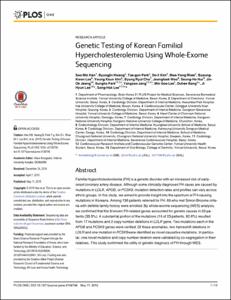KUMEL Repository
1. Journal Papers (연구논문)
1. School of Medicine (의과대학)
Dept. of Internal Medicine (내과학)
Genetic Testing of Korean Familial Hypercholesterolemia Using Whole-Exome Sequencing
- Keimyung Author(s)
- Hur, Seung Ho
- Department
- Dept. of Internal Medicine (내과학)
- Journal Title
- PLoS One
- Issued Date
- 2015
- Volume
- 10
- Issue
- 5
- Abstract
- Familial hypercholesterolemia (FH) is a genetic disorder with an increased risk of early-onset coronary artery disease. Although some clinically diagnosed FH cases are caused by mutations in LDLR, APOB, or PCSK9, mutation detection rates and profiles can vary across ethnic groups. In this study, we aimed to provide insight into the spectrum of FH-causing mutations in Koreans. Among 136 patients referred for FH, 69 who met Simon Broome criteria with definite family history were enrolled. By whole-exome sequencing (WES) analysis, we confirmed that the 3 known FH-related genes accounted for genetic causes in 23 patients (33.3%). A substantial portion of the mutations (19 of 23 patients, 82.6%) resulted from 17 mutations and 2 copy number deletions in LDLR gene. Two mutations each in the APOB and PCSK9 genes were verified. Of these anomalies, two frameshift deletions in LDLR and one mutation in PCSK9 were identified as novel causative mutations. In particular, one novel mutation and copy number deletion were validated by co-segregation in their relatives. This study confirmed the utility of genetic diagnosis of FH through WES.
- Keimyung Author(s)(Kor)
- 허승호
- Publisher
- School of Medicine
- Citation
- Soo Min Han et al. (2015). Genetic Testing of Korean Familial Hypercholesterolemia Using Whole-Exome Sequencing. PLoS One, 10(5), e0126706–e0126706. doi: 10.1371/journal.pone.0126706
- Type
- Article
- ISSN
- 1932-6203
- Appears in Collections:
- 1. School of Medicine (의과대학) > Dept. of Internal Medicine (내과학)
- 파일 목록
-
-
Download
 oak-aaa-04201.pdf
기타 데이터 / 1.95 MB / Adobe PDF
oak-aaa-04201.pdf
기타 데이터 / 1.95 MB / Adobe PDF
-
Items in Repository are protected by copyright, with all rights reserved, unless otherwise indicated.